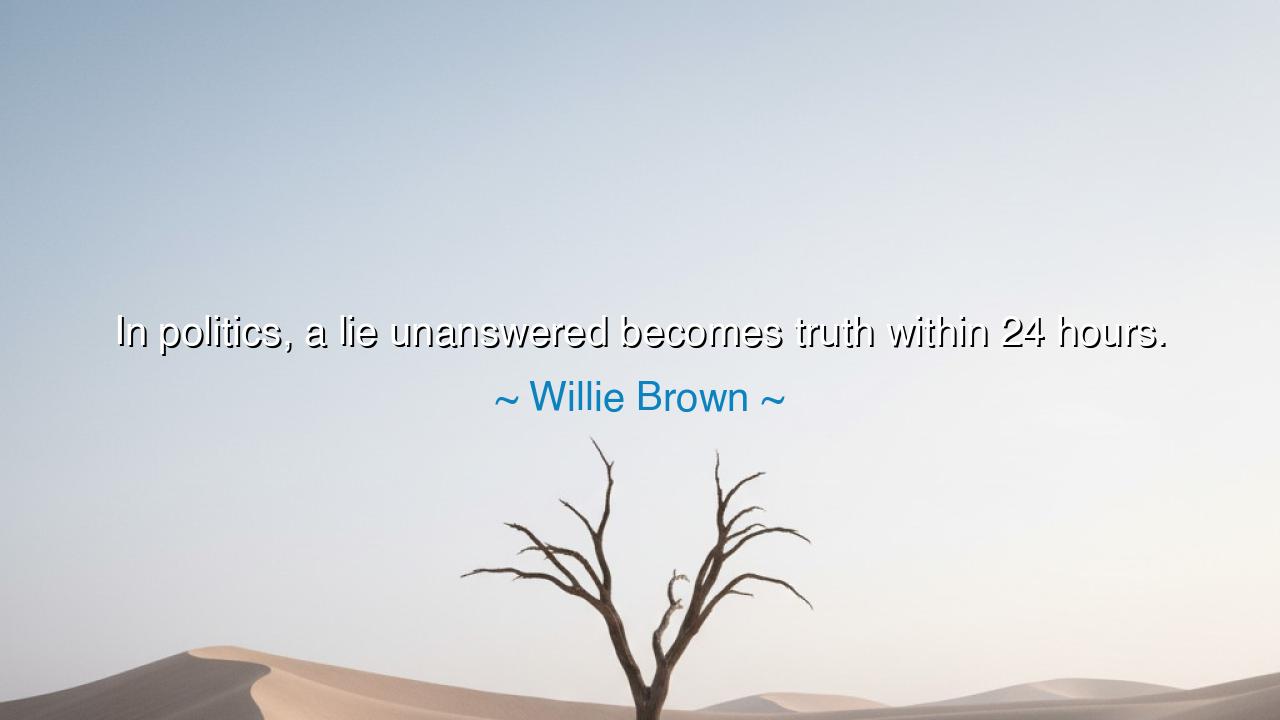
In politics, a lie unanswered becomes truth within 24 hours.






Hear the sharp and warning words of Willie Brown: “In politics, a lie unanswered becomes truth within 24 hours.” In this saying lies the recognition of a dangerous power—that in the realm of public life, falsehood spreads swiftly, and if it is not challenged, it takes root in the minds of the people as if it were truth. Time, though short, is enough for a lie to harden into belief, and belief, once established, is harder to uproot than the lie itself.
The ancients also knew this peril. When rumors arose in the Roman Senate, they could spark riots in the streets before the truth had a chance to rise. Julius Caesar himself was felled not only by daggers but by whispers—that he sought to make himself king, that he would enslave Rome. Whether or not these things were true mattered less than the speed of the lie, and by the time his blood stained the marble, the people had already accepted falsehood as fact.
History gives us many such lessons. In the years of the French Revolution, lies and pamphlets circulated faster than armies. Marie Antoinette was accused of saying, “Let them eat cake.” She never uttered these words, yet they became accepted truth in the minds of the people, fueling hatred and sealing her fate. One lie, unanswered, destroyed a queen and stained an age. Here we see the essence of Brown’s teaching: that in the absence of a strong voice for truth, deception becomes the master of nations.
Even in modern times, the same principle holds. Consider the era of McCarthyism in America, when accusations of communism spread like wildfire. Men and women, often innocent, were ruined because lies were spoken loudly and left unanswered. Fear amplified falsehood, and silence allowed it to thrive. Only when courageous voices began to confront these deceptions did the fever break, and the people awaken to the injustice of their frenzy.
Why is this so? Because the human heart is swift to believe what is sensational, what stirs anger or fear. Truth requires patience, reason, and courage, but lies appeal to passion and spread with ease. In politics, where power is at stake and crowds are stirred by words, silence in the face of falsehood is surrender. Thus Brown’s words are both a warning and a command: if you would preserve truth, you must defend it quickly, before the lie becomes the master.
The lesson for us is this: never let a lie stand unanswered. In public life, in private life, in your family, in your community, speak swiftly when deception arises. Do not imagine that silence will protect you, for silence is the soil in which falsehood flourishes. Answer with honesty, answer with courage, answer with clarity. Even if your voice shakes, it is better to speak than to allow darkness to masquerade as light.
So let this wisdom be written upon your heart: in every age, in every land, truth must be guarded, for lies are swift, and the people’s memory is fragile. Do not fear to confront falsehood when you see it. Act quickly, speak boldly, and defend reality with the fire of your words. For though lies move fast, the eternal strength of truth will always prevail—if only there are those brave enough to keep it alive.






NPnguyen phu
Brown’s quote speaks to the power of unchallenged narratives in politics. It makes me think about how the truth often struggles to keep up with falsehoods, especially when those lies are repeated by influential figures. How can we train ourselves and others to critically evaluate the information we receive? Is the real challenge not just identifying lies, but preventing them from taking root in the first place?
TNTrong Thuan Nguyen
I find Willie Brown’s statement to be both cynical and thought-provoking. It’s disturbing to think that a lie can take hold so quickly in politics, especially if it isn’t immediately corrected. What does this say about our trust in political leaders and the media? Are we too quick to accept things at face value, or is it that the truth sometimes doesn’t get the attention it deserves in the first place?
Hhu33uwuw
Willie Brown’s quote is both insightful and alarming. It seems to suggest that the power of a lie in politics grows exponentially if it’s left unanswered. How much of this phenomenon is due to the rapid spread of information in the digital age? With social media amplifying every statement, how can we effectively combat falsehoods before they become 'truth' in the eyes of the public?
VDNguyen Van Vo Duy
This quote really makes me think about the vulnerability of the public to political manipulation. It seems like, once a lie is out there and not addressed, it takes on a life of its own. How can politicians and the media work together to ensure facts are clarified quickly, rather than letting a false narrative dominate the conversation? Is it the responsibility of the public, the press, or both to challenge these lies?
NTngoc hue nguyen thi
Brown’s quote highlights the dangerous cycle of misinformation in politics. It makes me wonder—how often do we fall victim to this pattern of accepting lies simply because they go unchallenged for too long? Does the speed with which misinformation spreads have more to do with media influence or public apathy? What can we do as individuals to ensure we don’t contribute to this cycle of lies becoming ‘truth’?